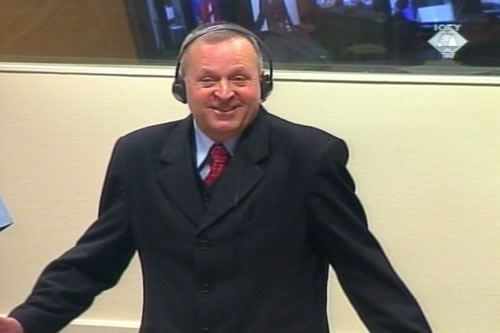Home
‘SOME OTHER’ MUJAHIDEEN
Protected witness at the trial of Rasim Delic confirmed the defense arguments saying that the El Mujahid Detachment were de facto an independent army, although de jure they were part of the BH Army chain of command from 8 August 1993. The defense contends that the crimes ascribed to the El Mujahid Detachment in Central Bosnia were in fact committed by other groups of foreign fighters. The prosecution alleges the El Mujahid Detachment committed those crimes
 Rasim Delic in the courtroom
Rasim Delic in the courtroom In the cross-examination of the protected prosecution witness PW-9, the defense of the former commander of the BH Army General Staff tried to prove that the El Mujahid Detachment had operated and made decisions independently despite the fact that it formally belonged to the BH Army 3rd Corps. The witness is a Bosniak who joined the El Mujahid Detachment in the fall of 1993. Answering the questions of the defense, he said that the order issued by the General Staff on 8 August 1993, signed by the accused Rasim Delic, incorporated the detachment into the BH Army 3rd Corps de jure. But de facto it was ‘a whole different army’. To exemplify this, the witness said the BH Army flag was never flown in the El Mujahid Detachment barracks, and its members never wore its insignia.
According to the witness, members of the El Mujahid Detachment made all decisions regarding combat operations independently. They only obeyed the orders of their military commanders – commander Abu Mali and Muatez Masri, his assistant for military issues. They were subordinated to the co-called ‘shura’ – the supreme body of the ‘jamat’, a wider community in which the detachment operated.
The witness explained that ‘jamat’ consisted of a number of institutions through which the community implemented its military and political objectives. A man called Sheikh Enver Saban was the head of the ‘jamat’. He was its ideological and political leader and, as the witness put it, ‘the only true authority’ among his followers.
The El Mujahid Detachment was a part of the ‘jamat’, the witness noted. It was an instrument for the implementation of military objectives. According to him, no other group of foreign fighters operating in Central Bosnia at that time was part of this community because they ‘had different views of religion’.
One group of foreign fighters fighting independently of both the BH Army and the El Mujahid Detachment was, as the witness explained, lead by a man called Abu Zubeir. He was nicknamed ‘Fatso’ because of his weight. The defense claims that before the war in Bosnia he had fought in Afghanistan were he had earned a reputation as a fearless fighter. In BH, his bases were in Zeljezno polje, Gluha Bukovica and allegedly in Kalesija.
The defense is trying to prove that the crimes ascribed to the El Mujahid Detachment in the indictment were in fact committed by the other groups of foreign fighters. Neither the locals nor the BH Army could distinguish between the members of the El Mujahid Detachment and those other groups because they all looked alike, the defense argues.
According to the witness, some two hundred Mujahideen fighters from Abu Zubeir’s unit fought in Vozuca in September 1995. On 11 September 1995, two days into the operation, he met a group of some thirty Abu Zubeir’s men. According to the indictment, the BH Army troops captured some 50 Serbian soldiers in the village of Kesten on that day and handed them over to the El Mujahid Detachment. They disappeared without a trace and are believed dead.
The El Mujahid Detachment captured a total of some 25 men in the three operations launched in Vozuca in 1995, the witness said. As far as he knew, they were ‘treated well’ and after some time were handed over to the BH Army 3rd Corps military police.
Linked Reports
- Case : Delic
- 2007-11-15 DELIC’S SPEECH ADMITTED INTO EVIDENCE
- 2007-11-14 PROSECUTION WITNESS CORROBORATES DEFENSE CASE
- 2007-11-13 NEW VERSION OF WHAT HAPPENED TO CAPTURED SERBIAN SOLDIERS
- 2007-11-21 QUESTIONING PRISONERS OF WAR
- 2007-11-23 MILITARY POLICE AND CRIME INVESTIGATION
- 2007-11-27 CRIMES WENT UNREPORTED
